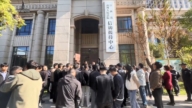【新唐人2014年12月12日訊】近來,中國大陸股市如同坐上「雲霄飛車」,在經歷了一段「瘋狂之旅」後,本週二突然「大跳水」,跌幅達到2009年以來最大。那麼各界聚焦並探討中國股市暴跌原因,雖然說法不一,但不少分析都認為,對於股民而言,風險是實實在在的。
過去一個月,受到中共央行意外減息等因素影響,中國股市開始加速上漲。11月底,A股市值甚至超越日本,僅次於美國,名列世界第二。
12月2號,國際評級機構標準普爾對中國銀行業風險發佈警告,但當天上海和深圳股市大漲,其中銀行股漲幅達6.27%。
本週一,滬指更是突破3000點大關,這是2010年以來第一次。
「牛市」似乎不足以形容過去兩週中國股市的瘋狂,所以大陸媒體開始用「瘋牛」來描述。
《人民日報》系列報導中,《新常態下這一年》,對於A股這波「牛市」,似乎也持歡迎態度。
北京「天則經濟研究所」所長助理段紹譯:「我覺得中國股市持續上漲的原因第一是因為老百姓沒有投資的渠道;第二房市面臨很不好的前景;第三就是很多中國的投資人多數是非理性的,他們不一定認為它值多少錢就投資多少錢,他是想:哎呀這麼多年的股市都沒有漲,應該要漲了,都是這麼一種預期;第四就是對股市很多的是被操縱的,總的來說中國的股市是一個非理性的市場。」
僅僅一天後,中國股市在週二創下了近5年來的最大單日跌幅。截至收盤,滬指下跌5.43%,以2,856.27點報收。深圳證券交易所的基準指數也下跌,收盤時跌幅達4.2%。
外界分析,造成這次股市暴跌的導火索,和中國證券登記結算公司8號發佈的一項通知有關,該通知涉及企業債券回購資格申請的最低要求提高等變更,使得外界擔憂機構流動性壓力可能增大。
另一個因素,則是關於IPO發行可能會加速的猜測。
不少分析師們認為此番「殺跌」是技術性調整。雖然分析師們不願輕易斷言,週二的「殺跌」代表這一輪「牛市」的終結。但人們也開始探討,這反映了中國經濟基本面的風險。
台灣《自由時報》發出警告,中國企業的財務不透明,本益比偏高,充滿詐騙,中國股市少碰為妙。
前騰訊財經頻道編輯張賈龍:「長期來看,一個國家的股市其實就是國民經濟的晴雨表,中國的經濟基本面是不太好的,你的股市會有震盪的上漲,但是總體來說是往下啦。至少在中國共產黨目前的這種經濟體制下它應該就是這樣。因為你從它的經濟速度、技術、制度還有人力資源各個方面來看的話,它並沒有太多取值。現在GDP的年增7.5%它都很難,股市不可能太好。」
《華爾街日報》10號刊文《中國股市週二大跌的五個原因》,其中提到,投資者對中國股市缺乏信心,許多散戶投資者認為股市中充斥著內幕交易,同時新股發行的政府審核制也使得股市跛足前行。報導擷取了微博上網友一條頗具代表性的貼子說:「我不知道為甚麼會出現這麼大的下跌,我也不知道為甚麼股市會上漲。這幾乎沒有任何的邏輯。」
北京「天則經濟研究所」所長助理段紹譯:「中國的股市是一個博彩市場,它不是一個真正的投資市場。真正的股市的價值來源於企業的價值,如果企業不賺錢股票上漲,這就是投機。企業賺了錢,股票賺了錢,這你就是投資。中國的股市一直有被操控因素。不只是現在,在過去、現在和將來很長時間,可能還是被操縱的。中國的股市是不代表經濟的發展水平的。」
不過,中國經濟數據的疲弱,還是讓外界對未來的A股走勢感到一些擔憂。
根據中共海關最近公布的外貿數據顯示,今年前11個月,中國進出口總值僅增長2.2%。11月份當月,中國進出口總值下降0.3%。低迷的外貿數據顯示出經濟的復甦前景不盡人意。
週三公布的11月CPI同比增長1.4%,更是創出了5年新低。
採訪/秦雪 編輯/王子琦 後製/周天
Roller Coaster Ride Reflects Risk Behind China’s Stock Market
China’s stock market was on a roller coaster ride recently.
After going up crazily for some while, China’s stock indices
suddenly began to dive since Tuesday.
A record-sized slump since 2009 was recorded.
Many articles have been published to analyze
why such a sharp drop occurred.
There are different theories but most analysts agree that
the risk is real for investors in China’s market.
During the past month, China’s stock market rose fast.
This was believed to result from a surprising cut in interest
rates as well as other factors.
By the end of November, China’s A-share market value
exceeded that of Japan,.
This ranking was the second largest market in the workd
next to the United States.
On Dec.2, Standard & Poor’s issued a risk warning on
China’s banking industry.
On the same day, both Shanghai and Shenzhen composite
indices saw an unexpected sharp rise.
Bank shares also rose by as much as 6.27 percent.
This Monday, Shanghai composite index topped 3000
for the first time since 2010.
A “bull market” seems insufficient to describe China’s
white-hot stock market.
Some Chinese media introduced the term “mad bull”.
The People’s Daily published a series of reports titled
“A Year in New Normal States”.
The articles apparently show a welcome attitude toward
the “bull market” in A-share stocks.
Duan Shaoyi, director assistant of Beijing Unirule Institute of
Enonomy, ”Personally, I think the continuous rise in China’s
stock market essentially results from the fact that our people
have no other investment options.
Secondly, the real estate market currently has
no good prospects.
Thirdly, many Chinese investors are not rational.
The decisions may not be based on the real value of
what they invest.
Many people think like this: the stock market has not
been rising for a long time so probably it will rise soon.
Many Chinese simply prospect for things like that.
Finally, China’s stock market is frequently manipulated.
In general China’s equity market is an irrational one.”
The following day, China’s stock market suffered
the largest tumble in 5 years.
The Shanghai composite index closed at 2856.27,
dropping by 5.43 percent.
Shenzhen composite index also dropped by 4.2 percent
at the close.
Analysts said, the big selloff is related to an announcement
of China’s securities clearing house on Dec. 8.
The announcement said the threshold for corporate bonds
qualifying as collateral for repurchase agreements was raised.
This led to concern about increasing liquidity
pressure on financial institutions.
Another reason leading to the slump is the speculation
about potential acceleration of the pace of IPOs.
Many analysts believe that the selloff can be just a result
of technical adjustment.
Most of them still hesitate to assert that the slump will
end the “bull market”.
However, people begin to discuss the risks from most
fundamental aspects of China’s economy.
Taiwan-based Liberty Times warned that, Chinese firms
lack financial transparency, have high price-earnings ratios
and much more frequently make frauds. It is better not to
touch China’s equity market.
Zhang Jialong, former editor of Tencent Finance Channel,
“In the long-term view, equity market serves as a bellwether
of the state economy.
The basis of China’s economy is not looking good.
Therefore even if the stock market appears to rise
periodically, it should see an overall drop.
To say the least this should be case under the governance
of the Chinese Communist Party (CCP).
In reviewing economic growth, technical development, the
political system and human resources, there is not much
positive to say.
Currently maintaining a 7.5 percent GDP growth already has
become a difficult task for the CCP.
So the stock market prospect cannot be that good.”
On Dec.10, the Wall Street Journal published an article
titled “5 Reasons China’s Stocks are Tanking”.
The article said, investors lack confidence in China’s stock
market as it is “plagued by insider trading and hobbled
by state regulation of initial public offerings”.
The article quoted a typical comment on weibo, which says,
“I don’t know why this stuff dropped, and I don’t know why
it goes up either; there’s almost no logic.”
Duan Shaoyi, director assistant of Beijing Unirule Institute
of Enonomy, ”China’s stock market is more like a lottery
game than a place for investment. Real stock values should
be consistent with the value of its company.
If the company makes little money but its stock value is rising,
this can only be called speculation.
Investment means making dividends from holding shares.
In comparison, China’s stock market has always been
somehow manipulated.
This is true in the past, in the present, and probably
for a long time to come as well.
In a word, China’s stock market does not reflect
the state’s true economy.”
In the meantime, China’s weaker economic data
raises concerns over the future of A-shares.
According to the CCP’s latest official foreign trade statistics,
China’s imports and exports trade volumes only rose
by 2.2 percent in the first 11 months of 2014.
In November, imports and exports trade volumes dropped
by 0.3 percent, indicating a pessimistic prospect of China’s
economic recovery.
On Wednesday, the CCP officially announced November’s
CPI increased by 1.4 percent on an annual basis, hitting a
record-low in five years.



























